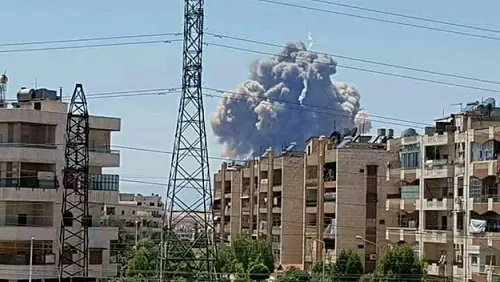At least 12 people have been reported dead in violence during a nationwide protests led by India’s Dalits, according to media reports on Tuesday.
Dalits, at the bottom of India's ancient caste hierarchy, took to the streets on Monday after the Supreme Court ruled last month that arrests under a law meant to speed action on complaints of violence against Dalits required prior approval from officials, and barred the immediate arrest of those accused in such complaints.
People belonging to the Dalit community shout slogans as they are detained by the police during a protest following a nationwide strike called by Dalit organizations, in Chandigarh, India, on April 2, 2018.
Addressing the parliament on Tuesday, India’s Home Minister Rajnath Singh put the death toll from Monday’s violence at eight – six in the central state of Madhya Pradesh and one each in northern Uttar Pradesh and northwestern Rajasthan states. Some media reports later updated the number of those killed to 12, citing police sources.
"The death toll in Madhya Pradesh now stands at seven, with two protesters succumbing to their injuries. Two people already died in Uttar Pradesh and one in police firing in Rajasthan," a police official said on Tuesday.
Reports of two additional deaths emerged – one from the eastern state of Bihar where a baby died and the other of a 68-year-old man from Uttar Pradesh. In both the cases, two ambulances carrying the duo respectively got stuck in snarls triggered by the protesters.
Madhya Pradesh, Uttar Pradesh and Rajasthan were among the five Indian states – others being Punjab and Jharkhand – that bore the brunt of the violence as Dalit protesters damaged public and private properties, and set afire several vehicles to vent out their anger.
Exams have been postponed and Internet services have been shut down due to clashes in Punjab.
Television showed police beating protesters and an unidentified person firing shots, with demonstrators in the northern state of Haryana also setting police posts ablaze and attacking shops.
"Get out in strong numbers, block the roads if needed, but do not touch public property," Jignesh Mevani, an independent Dalit lawmaker from the western state of Gujarat, told the India Today news channel. Although he backed the protests, Mevani said he was opposed to any damage to public property.
Mayawati Das, former chief minister of Uttar Pradesh and a prominent Dalit politician, also supported the protests while condemning violence.
Shops were shut as protesters blocked key roads in many areas, including the capital, New Delhi, and the industrial city of Ahmedabad in Modi's home state of Gujarat, the Times of India newspaper reported.
Curfew was imposed in several places and hundreds were detained on Monday as police and security forces tried to restore order. Madhya Pradesh's interior minister Bhupendra Singh said the situation in the state was almost normal.
Meanwhile, the Supreme Court agreed to hear an urgent review petition filed by Prime Minister Narendra Modi's government, which has urged the top court to amend the March 20 judgment that sparked the protests. The government has also sought a stay on the court's order.
Dalits, together with the scheduled tribes – indigenous peoples who are often isolated or disadvantaged – form about a quarter of India's population of 1.3 billion. They have historically faced various forms of discrimination including segregation and social boycott, in addition to violence.
Discrimination on the basis of caste is outlawed in India but remains widespread across the country. And there have been several instances where Dalits have been made the targets by the so-called upper caste people.
(CGTN)
 简体中文
简体中文

